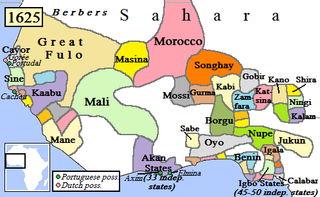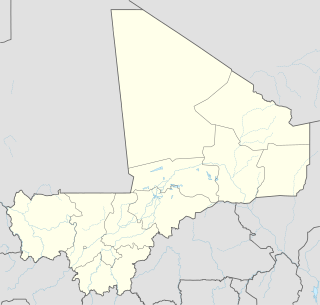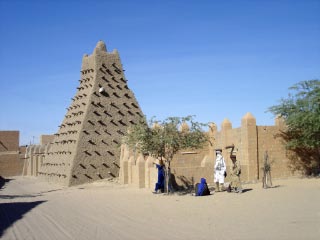
The Songhai Empire was a state that dominated the western Sahel in the 15th and 16th century. At its peak, it was one of the largest states in African history. The state is known by its historiographical name, derived from its leading ethnic group and ruling elite, the Songhai. Sonni Ali established Gao as the capital of the empire, although a Songhai state had existed in and around Gao since the 11th century. Other important cities in the empire were Timbuktu and Djenné, conquered in 1468 and 1475 respectively, where urban-centered trade flourished. Initially, the empire was ruled by the Sonni dynasty, but it was later replaced by the Askia dynasty (1493–1591).

Djenné is a town and an urban commune in the Inland Niger Delta region of central Mali. The town is the administrative centre of the Djenné Cercle, one of the eight subdivisions of the Mopti Region. The commune includes ten of the surrounding villages and in 2009 had a population of 32,944.

Mopti is the fifth administrative region of Mali, covering 79,017 km2. Its capital is the city of Mopti. During the 2012 Northern Mali conflict, the frontier between Southern Mali which is controlled by the central government and the rebel-held North ran through Mopti Region.

Mopti is a town and an urban commune in the Inner Niger Delta region of Mali. The town is the capital of the Mopti Cercle and the Mopti Region. Situated 460 km northeast of Bamako, the town lies at the confluence of the Niger and the Bani Rivers and is linked by an elevated causeway to the town of Sévaré. The urban commune, which includes both Mopti and Sévaré, had a population of 114,296 in the 2009 census.

Sunni Ali, also known as Sunni Ali Ber, was born in Ali Kolon. He reigned from about 1464 to 1492. Sunni Ali was the first king of the Songhai Empire, located in Africa and the 15th ruler of the Sunni dynasty. Under Sunni Ali's infantry and cavalry many cities were captured and then fortified, such as Timbuktu and Djenné. Sunni conducted a repressive policy against the scholars of Timbuktu, especially those of the Sankore region who were associated with the Tuareg whom Ali expelled to gain control of the town.
Seku Amadu was the Fulbe founder of the Massina Empire in the Inner Niger Delta, now the Mopti Region of Mali. He ruled as Almami from 1818 until his death in 1845, also taking the title Sise al-Masini.
Askia Ishaq II was ruler of the Songhai Empire from 1588 to 1591.

Articles related to Mali include:

The Dendi Kingdom (1591–1901) was a West African state in modern-day Niger founded by the Dendi people after the collapse of the Songhai Empire. It was conquered by France in 1901.

Djenné-Djenno is a UNESCO World Heritage Site located in the Niger River Valley in the country of Mali. Literally translated to "ancient Djenné", it is the original site of both Djenné and Mali and is considered to be among the oldest urbanized centers and the best-known archaeology site in sub-Saharan Africa. This archaeological site is located about 3 kilometres (1.9 mi) away from the modern town, and is believed to have been involved in long distance trade and possibly the domestication of African rice. The site is believed to exceed 33 hectares ; however this is yet to be confirmed with extensive survey work. With the help of archaeological excavations mainly by Susan and Roderick McIntosh, the site is known to have been occupied from 250 B.C. to 900 A.D. The city is believed to have been abandoned and moved where the current city is located due to the spread of Islam and the building of the Great Mosque of Djenné. Previously, it was assumed that advanced trade networks and complex societies did not exist in the region until the arrival of traders from Southwest Asia. However, sites such as Djenné-Djenno disprove this, as these traditions in West Africa flourished long before.
Dambé: The Mali Project is a documentary film directed by Dearbhla Glynn, and produced by Vanessa Gildea. The film documents as the Irish musicians Liam Ó Maonlaí and Paddy Keenan embark on a musical adventure to Mali in West Africa. Travelling over 3,000 miles they meet and collaborate with people from musicians to nomadic herders, culminating in a performance at the remote musical festival Festival au Désert.

Visitors to Mali must obtain a visa from one of the Malian diplomatic missions unless they come from one of the visa exempt countries.

The Battle of Gao was fought between the National Movement for the Liberation of Azawad (MNLA) and the Islamist Movement for Oneness and Jihad in West Africa (MOJWA), along with its ally Ansar Dine, in Gao between 26–28 June 2012. By the 28 June, Gao, Timbuktu and Kidal, the three biggest cities in the disputed secessionist region of Azawad within what is recognised as Malian territory, were under the control of Ansar Dine and its Islamist allies.
Dr. Téréba Togola (1948–2005) was a Malian archaeologist from Sikasso. He participated in the country's first national inventory of its archaeological sites.
Prostitution in Mali is legal, but third party activities such as procuring are illegal. Prostitution is common in Malian cities. UNAIDS estimate there to be 35,900 prostitutes in the country. Prostitution is on the rise, many having turned to prostitution because of poverty.

The Fall of Timbuktu took place during the war in northern Mali. This is one of the first clashes between the MNLA and Ansar Dine.





















